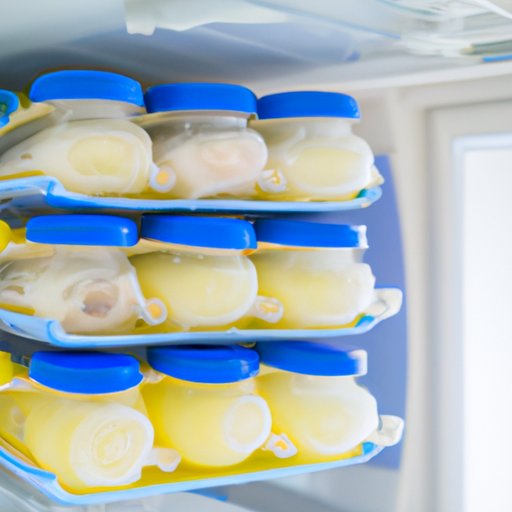Introduction
Breast milk is a nutrient-rich liquid produced by mothers to nourish their infants. It’s the ideal food for newborn babies, providing essential nutrients and antibodies that boost the baby’s immune system. It’s also easy to digest and helps protect against many common childhood illnesses.
In some cases, it may be necessary to store breast milk for later use. In these cases, freezing is an effective way to preserve the milk’s quality and nutritional value. But how long can you keep breast milk in the freezer? Read on to find out.
How Long Does Breast Milk Last When Frozen?
According to the Centers for Disease Control and Prevention (CDC), breast milk can be stored safely in the freezer for up to six months. However, this timeframe may vary depending on several factors, including the type of container used, how often the milk is thawed and refrozen, and how cold the freezer is.
It’s important to follow safe storage guidelines to ensure the milk remains safe for your baby to consume. The CDC recommends using shallow containers or bags to freeze breast milk, as these will freeze faster and reduce the risk of spoilage. The milk should also be labeled with the date it was expressed, as well as the number of ounces or milliliters it contains.

Tips for Safely Freezing and Storing Breast Milk
To ensure your frozen breast milk remains safe for your baby, there are a few best practices you should follow:
- Store the milk in small amounts: This will help prevent waste if your baby doesn’t finish the entire bottle. It’s also best to freeze the milk in individual servings, as this makes it easier to thaw and reheat.
- Leave room at the top of the container: As the milk freezes, it expands, so it’s important to leave some space at the top of the container. Otherwise, the lid could pop off and the milk could leak.
- Don’t overfill the container: Be sure not to fill the container too full, as this can cause the milk to spoil.
- Store the milk in the back of the freezer: To ensure the milk stays as fresh as possible, store it in the back of the freezer, away from the door.
What You Need to Know About Thawing Breast Milk
When it comes time to thaw the frozen breast milk, it’s important to do it safely. The CDC recommends thawing the milk in the refrigerator or by running it under warm water. Never microwave breast milk, as this can cause hot spots, which can burn your baby’s mouth.
It’s also important to check the milk for signs of spoilage before feeding it to your baby. Signs of spoilage include a sour smell, clumping, or a change in color. If the milk has spoiled, discard it immediately.

How to Store Breast Milk to Maximize Its Nutritional Value
Freezing breast milk can help preserve its nutritional value, but there are steps you can take to ensure the milk retains as much of its nutritional value as possible.
First, make sure you’re storing the milk in an airtight container. Also, consider adding a vitamin E supplement to the milk before freezing. Vitamin E helps maintain the milk’s fatty acids and can help protect the milk’s nutritional value during storage.
Finally, ensure the milk is stored at a consistent temperature. Avoid opening the freezer door too often and try to limit temperature fluctuations, as this can cause the milk to lose its nutritional value.
Conclusion
Storing breast milk in the freezer can be a great way to ensure your baby has access to nutritious meals, even when you’re not around. However, it’s important to follow safe storage guidelines and store the milk properly to maximize its nutritional value and ensure it remains safe for your baby to consume.
For best results, store the milk in small amounts in airtight containers, leave some space at the top, and store it in the back of the freezer. When it comes time to thaw the milk, do so slowly in the refrigerator or by running it under warm water, and avoid microwaving it. Finally, add a vitamin E supplement to the milk before freezing to help maintain its nutritional value.


